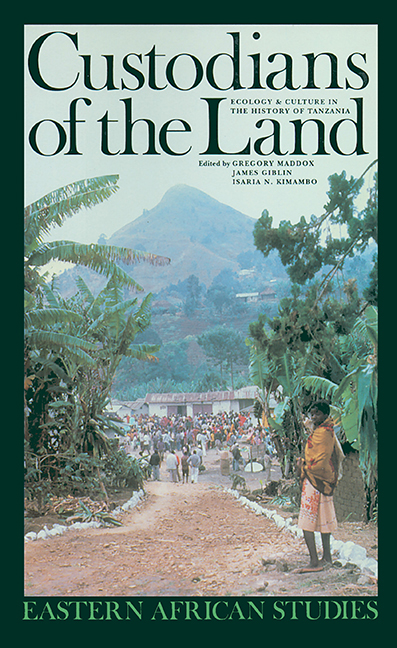Book contents
- Frontmatter
- Contents
- List of Maps, Figures & Tables
- List of Photographs
- Abbreviations
- Contributors
- Acknowledgements
- Introduction Custodians of the Land: Ecology & Culture in the History of Tanzania
- Part One Environmental & Demographic Change
- Part Two Environmental Change & Economic History: In Tanzania's Northern Highlands
- Three Environmental Control & Hunger: In the Mountains & Plains of Northeastern Tanzania
- Four Nature Reorganized: Ecological History in the Plateau Forests of the West Usambara Mountains 1850-1935
- Part Three Politics & Environmental Change
- Part Four Environment & Morality
- Conclusion
- Bibliography
- Index
Four - Nature Reorganized: Ecological History in the Plateau Forests of the West Usambara Mountains 1850-1935
from Part Two - Environmental Change & Economic History: In Tanzania's Northern Highlands
Published online by Cambridge University Press: 30 August 2017
- Frontmatter
- Contents
- List of Maps, Figures & Tables
- List of Photographs
- Abbreviations
- Contributors
- Acknowledgements
- Introduction Custodians of the Land: Ecology & Culture in the History of Tanzania
- Part One Environmental & Demographic Change
- Part Two Environmental Change & Economic History: In Tanzania's Northern Highlands
- Three Environmental Control & Hunger: In the Mountains & Plains of Northeastern Tanzania
- Four Nature Reorganized: Ecological History in the Plateau Forests of the West Usambara Mountains 1850-1935
- Part Three Politics & Environmental Change
- Part Four Environment & Morality
- Conclusion
- Bibliography
- Index
Summary
This chapter examines ecological change on northeastern Tanzania's Usambara mountain massif. It focuses on the central plateau forest region of West Usambara, where, between the mid-nineteenth century and the late 1930s, social and economic changes among herding communities, known locally as the Wambugu, led to a marked change in their relationship with nature. Ecological change began with the breakdown in complementary social and economic relations between the Wambugu, who occupied the upland forests, and their neighbours, the Washambaa, who farmed the slopes and basins lower on the elevation gradient and nearer to the massif edge.
The Wambugu settled in Usambara's mountain forests sometime during the early eighteenth century. By the mid-nineteenth century, they had managed to carve out a well-defined territorial niche for themselves as pastoralists. Their adaptation depended on a well-spring of environmental knowledge, careful resource management and complex social relations among various Mbugu communities. However, what Mbugu oral histories now interpret as a precolonial ethic of pastoralism and forest conservation in an isolated society was only possible so long as the Mbugu communities maintained social and economic ties with their Shambaa neighbours. When these relations broke down completely during the 1880s and 1890s, the Wambugu were forced to shift from raising cattle, sheep and goats to growing crops. This transformation, when coupled with the problems created by colonial policies, had long-term consequences for both the forest environment of central Usambara and Mbugu culture.
This study's approach to ecological change stresses a diachronic analysis of the interactions among social relations, local and regional economy and the environment. The first section outlines the natural history of Usambara and explains how Mbugu precolonial socioeconomic relations and pastoral production operated in this environmental context. The second section shows how disease and the slave trade, which brought violence and disorder to the Usambara Mountains and the Pangani Valley, disrupted the nineteenth century Mbugu economy and altered the ecology of central Usambara. Finally, the discussion turns to the colonial economy and argues that German and British colonial policies, which precluded the re-establishment of precolonial arrangements, further undermined the viability of Mbugu pastoralism and resulted, by the 1930s, in contentious land disputes.
Natural and human histories converge: social and economic relations in a precolonial mountain environment
The Usambara Mountains rise from the dry savannah, forming an island of climatic regularity.
- Type
- Chapter
- Information
- Custodians of the LandEcology and Culture in the History of Tanzania, pp. 96 - 122Publisher: Boydell & BrewerPrint publication year: 1996

